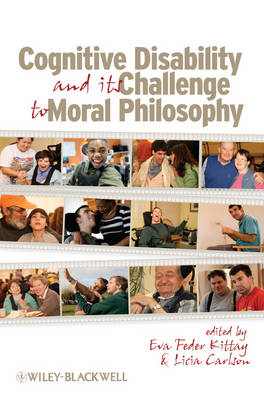
Cognitive Disability and Its Challenge to Moral Philosophy
Wiley-Blackwell (Verlag)
978-1-4051-9828-8 (ISBN)
Through a series of essays contributed by clinicians, medical historians, and prominent moral philosophers, Cognitive Disability and Its Challenge to Moral Philosophy addresses the ethical, bio-ethical, epistemological, historical, and meta-philosophical questions raised by cognitive disability
Features essays by a prominent clinicians and medical historians of cognitive disability, and prominent contemporary philosophers such as Ian Hacking, Martha Nussbaum, and Peter Singer
Represents the first collection that brings together philosophical discussions of Alzheimer's disease, intellectual/developmental disabilities, and autism under the rubric of cognitive disability
Offers insights into categories like Alzheimer's, mental retardation, and autism, as well as issues such as care, personhood, justice, agency, and responsibility
Eva Feder Kittay is Professor of Philosophy, Women's Studies Affiliate, and Senior Fellow of the Center for Medical Humanities, Bioethics and Compassionate Care at Stony Brook University, New York. Her published works include Love's Labor: Essays on Women, Equality, and Dependency (1998); The Blackwell Guide to Feminist Philosophy (co-edited with Linda Martín Alcoff, Blackwell, 2006); The Subject of Care: Feminist Perspectives on Dependency (with Ellen K. Feder, 2003); and Metaphor: Its Cognitive Force and Linguistic Structure (1990). She is also the mother of a cognitively disabled woman. Licia Carlson is Assistant Professor of Philosophy at Providence College. Her research interests include 20th-century French philosophy, ethics, feminist theory, philosophy and disability, and the philosophy of music. She has published articles on bioethics, feminist theory, disability, and the works of Michel Foucault, and has written a book entitled The Faces of Intellectual Disability: Philosophical Reflections.
Notes on Contributors. 1. Introduction: Rethinking Philosophical Presumptions in Light of Cognitive Disability (Licia Carlson and Eva Feder Kittay).
Part 1: Intellectual Disability: The Medical Model and Beyond
2. The Limits of the Medical Model: Historical Epidemiology of Intellectual Disability in the United States (Jeffrey P. Brosco).
3. Developmental Perspective on the Emergence of Moral Personhood (James C. Harris).
Part 2: Justice
4. The Capabilities of People with Cognitive Disabilities (Martha Nussbaum).
5. Equality, Freedom, and/or Justice for All: A Response to Martha Nussbaum (Michael Bérubé).
6. Respecting Human Dignity: Contract Versus Capabilities (Cynthia A. Stark).
7. Duties of Justice to Citizens with Cognitive Disabilities (Sophia Isako Wong).
Part 3: Care
8. Cognitive Disability in a Society of Equals (Jonathan Wolff).
9. Holding One Another (Well, Wrongly, Clumsily) in a Time of Dementia (Hilde Lindemann).
10. Agency and Moral Relationship in Dementia (Bruce Jennings).
Part 4: Agency
11. Cognitive Disability, Paternalism, and the Global Burden of Disease (Daniel Wikler).
12. Responsibility, Agency, and Cognitive Disability (David Shoemaker).
13. Alzheimer’s Disease and Socially Extended Mentation (James Lindemann Nelson).
14. Thinking About the Good: Reconfiguring Liberal Metaphysics (or Not) for People with Cognitive Disabilities (Anita Silvers and Leslie Pickering Francis).
Part 5: Speaking About Cognitive Disability
15. How We Have Been Learning to Talk About Autism: A Role for Stories (Ian Hacking).
16. The Thought and Talk of Individuals with Autism: Reflections on Ian Hacking (Victoria Mcgeer).
17. The Entanglement of Race and Cognitive Disability (Anna Stubblefield).
18. Philosophers of Intellectual Disability: A Taxonomy (Licia Carlson).
Part 6: Personhood
19. Speciesism and Moral Status (Peter Singer).
20. Cognitive Disability and Cognitive Enhancement (Jeff Mcmahan).
21. Caring and Full Moral Standing Redux (Agnieszka Jaworska).
22. The Personal Is Philosophical Is Political: A Philosopher and Mother of a Cognitively Disabled Person Sends Notes from the Battlefield (Eva Feder Kittay).
Index.
| Erscheint lt. Verlag | 14.5.2010 |
|---|---|
| Verlagsort | Hoboken |
| Sprache | englisch |
| Maße | 155 x 231 mm |
| Gewicht | 508 g |
| Themenwelt | Geisteswissenschaften ► Philosophie ► Ethik |
| Geisteswissenschaften ► Psychologie ► Allgemeine Psychologie | |
| Geisteswissenschaften ► Psychologie ► Verhaltenstherapie | |
| Medizin / Pharmazie ► Medizinische Fachgebiete ► Medizinethik | |
| Medizin / Pharmazie ► Medizinische Fachgebiete ► Neurologie | |
| Studium ► Querschnittsbereiche ► Geschichte / Ethik der Medizin | |
| ISBN-10 | 1-4051-9828-1 / 1405198281 |
| ISBN-13 | 978-1-4051-9828-8 / 9781405198288 |
| Zustand | Neuware |
| Haben Sie eine Frage zum Produkt? |
aus dem Bereich


